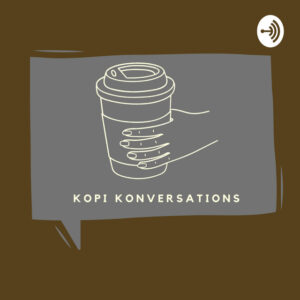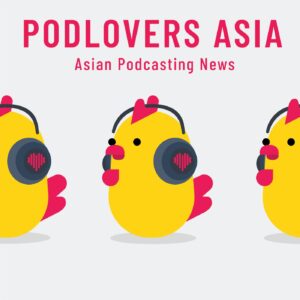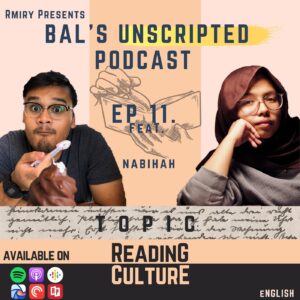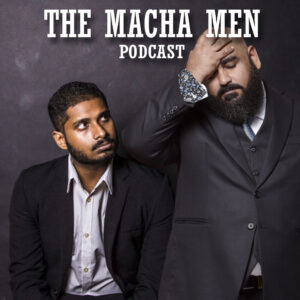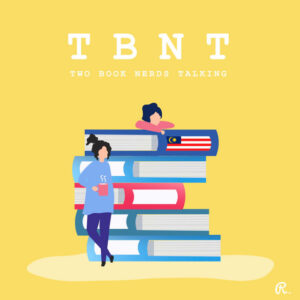A few months ago, Seek to Speak released its first bi-weekly podcast episode on Exercising Expression. The podcast aims to empower expression, spark speeches, and instigate ideas. Every episode is joined by a guest specializing in a particular industry who I interview with a public speaking angle. The hope was that others would be inspired to speak up after hearing the guests’ incredible stories, while the website would provide the tools in which to actualise that goal.
Through the podcast, I have learned and unlearned so much about myself, my skill set, and what I value. I remember recording my first episode during the MCO with my abysmal monologue, fretting and worrying about how I sound. I was so scared of judgment that I didn’t even tell anybody about my podcast. Now, four months and seven episodes later, I’m renting rooms at co-working spaces to interview guests (strangers I approached via email) and shamelessly promoting the podcast on my socials. Before I knew it, the podcast managed to empower me as well!
So this article hopes to encourage more people to start their own podcast by telling you why you should start one, how to get started, and great examples of amazing local podcasters.
WHY you should start a podcast
There are (so) (very) many reasons why starting a podcast enriches your self-development and inevitably catapults your speaking abilities. However, I have decided to distill the benefits of podcasting into three simple Ps. In particular, why the Platform, Process, and People of podcasting will change your life for the better!
The Platform: Audio Media
Unlike blogging or video journaling, podcasting is probably the only media that allows you to discover and amplify your voice, both literally and metaphorically! Your actual voice is how you wish to be heard by your listeners — your pitch, tone, and articulation. Your metaphorical voice — the persona, personality or version of yourself you would like to reveal to the public — is your speciality, niche or character.
Unlike YouTubing, you take away the frills of having to think about how you look and act, forcing you to focus on really just what you have to say. There is also a strange comfort in knowing that your listeners aren’t active listeners, meaning that they will likely be passively consuming your content while they go about their daily lives, either driving to work or doing the dishes.
The platform creates a safe space for you to share your thoughts without feeling like the eyes of the whole world are on you. It also means that your audience is a lot more forgiving of your mistakes, like your fillers or pauses. At the same time, the knowledge that your voice is intimately and personally being consumed by somebody out there directly into their ears — your words flooding their senses, your views changing their minds — is an incredibly powerful feeling.
The Process: Planning, Producing, & Delivering Content
Delivering a speech usually means researching on the topic and practicing for the speech. Creating a podcast is done with a lot more intention. When it comes to planning Seek to Speak’s podcast, I get to decide the principles and values behind the show.
Unlike a speech exercise where the topic or theme is usually assigned to you, it was the first time I got to decide who my audience is, what my message would be, and what effect I want my podcast to have. I think about how long the episode should be, what form it should take — Q&A, monologue, conversation? — who I want on the show, and who I want to be on the show as well.
These are the same considerations that would push a speech to greater heights. When writing a speech or presentation, we usually direct our thinking inward. However, the “show” element of the podcast makes us think about the audience, the world and ourselves in it as well.
Technical planning started out as a nightmare because there were so many mic options out there, so many hosting sites to choose from, and many platforms to plug in your podcast. Learning how to record, edit, and publish my podcast was difficult — there was no ONE resource that had everything I needed. You have to look everywhere, consume all available information, and make your own decisions.
However, the learning process was not difficult at all. At the end of the day, you can simply decide to record a podcast using your earphones and phone. I am happy to say that I’ve learned many new technical skills from this experience, and learning new things went from being a chore to a joy.
The People: Podcasting guests and community
Podcasting gives you an incredible excuse to reach out and connect with people in order to gain knowledge and perspectives. It’s like a VIP all-access pass to pick the minds of amazing people you admire. I started out interviewing my close friends, then people I know of, and now just cold-emailing people I didn’t know at all! Recently, I just concluded an online interview (another new thing I learned!) with a great podcasting guru who inspired me to start podcasting in the first place.
It also gave me access to a small (but growing!) podcasting community within Malaysia. This has helped me discover a bunch of other awesome local podcasters which I get to experience and support. My last two episodes referenced 3 other local podcasters, hoping to contribute to the local podcasting scene in any way!
Things that scared me previously, like randomly approaching people online, awkwardly interviewing strangers, and being brave enough to disagree with certain views, are now things that I am getting better and better at.

HOW to plan a podcast
Here, I am going to discuss what I deem to be the “foundation” of all podcast shows regardless of what subject it covers or what form it takes, i.e. Q&A, Story Narrative, Monologue, etc. I will not talk about the technical aspects of starting a podcast as you can already find many resources online, but I think even before deciding which mic to buy or who to interview, you must first establish your podcast plan.
Eric Nuzum, in his book, “Make Noise: A Creator’s Guide to Podcasting and Great Audio Storytelling”, taught me that before starting a podcast, you must think about these four words: THEM, WHAT, YOU, and WHY. He arranged these aspects in a circle to illustrate how they are interrelated and interconnected.


THEM: Your Audience
THEM is your audience. This consideration is at the top of the circle as it represents the most important aspect to consider when you’re deciding how to approach the show. Who is your audience? What do they like or want? How can you best serve them?
In his book, Eric tells his readers to not just think of a target audience but to visualise a specific audience member as well. Google what you think an audience member looks like and write them a background story. Every time you’re undecided about your podcast, go back to your audience and an answer will present itself. Eric suggested printing and pasting a picture of your audience member in your studio — as a reminder of why you do what you do!
For the Seek to Speak podcast, my “THEM” are students and young graduates who want to better communicate and express themselves in order to progress their career and improve their relationships. I visualised an audience member and created her story.


This is Wei Ling. She is a third-year student from Universiti Malaya. She has good grades but she is very shy. She wants to be more confident with herself so that she can ace future interviews and get a good job. She will like Seek to Speak’s podcast because listening to people’s speaking journeys will inspire her to be brave herself. She takes public transport to go to university, giving her a lot of time to listen to podcasts.
I think about Wei Ling when I speak to my guests. I imagine what she would like to hear and include them as my questions. I think Wei Ling would want to know more about confidence-building, finding a mentor and community, as well as how to find her voice. Hence, you will see a lot of these themes discussed on the show.
WHAT: Your message
The next thing is your WHAT. What exactly will you be talking about? This represents the message or essence of your podcast. What is it you are trying to prove or show? What are you advocating or discouraging? A podcast welcoming the rise of technology is very different from a podcast about how technology causes inequalities and social ills.
For example, Seek to Speak’s WHAT is the value of self-expression and the importance of speaking up. Throughout our episodes, and no matter the guest, these principles resonate in all of the conversations I’ve had.


YOU: Your voice
The third point is all about YOU. You need to think about why you are the best person to talk about the subject you have chosen, and decide which version of yourself you want to portray. Do you have a special interest or a lot of experience in the field which makes you an expert? Or are you quite the opposite — just an average Malaysian speaking on national issues, making you relatable and authentic? Remember that every person is a lot of things at once so it is important to hone into the personality or persona you would like to highlight on the show.
You will notice that “YOU” is placed at the very bottom of the circle. This was intentional for Eric as he said that you will always be serving the interest of your audience (THEM) and your message (WHAT), as well as your purpose (WHY).
So while I am many things — a former practicing lawyer, wife, varsity debater, Malaysian, and legal counsel — the persona I want to portray on my podcast is the public speaking teacher side of me. A teacher who is passionate about teaching communication and critical thinking skills. This is the version of me that will interview guests and make observations.
WHY: Your goal
The last point in the circle would be your WHY and your intention behind the podcast. What is your goal for this podcast? What is the effect you want to have on your audience? Do you want them to cry or be moved by your words? Do you want to advocate for a cause?
Your WHY is your metric of success — the goalpost to gauge whether or not you are doing a good job. Your WHY should be tied to your WHAT, i.e. your message, and shouldn’t be about externalities that you can’t control, like making money or becoming famous.
Seek to Speak’s WHY is to inspire listeners to better verbalize themselves and their stories. Once our listeners understand our message, they would be more inspired to speak-up and share their views.


How these tips work for speeches too
While these principles were created for podcasting, I truly believe that it can be used to better structure speeches and presentations as well. To prove my point, I actually taught these principles to my public speaking students once semester reopened and it resulted in delightful and well-thought-out presentations.
After my students worked on their show’s WHY, THEM, WHAT and YOU, it was so easy to put everything together. Instead of rushing to craft a speech and pack it with as much info as possible, my students presented with purpose and intention. Within a short 2-hour time frame, my students (who are between 10 to 15 years old), managed to conceptualise a show and create short impromptu trailers.
Previously, my students wouldn’t even think about who the audience is and what content they should put out based on their message and purpose. Now, such considerations come naturally when they decide to speak. Needless to say, I was extremely pleased with the result. In fact, here are some of their delightful promos:
Examples of great local podcasts
This portion of the article is dedicated to commemorating and celebrating the local podcasting scene. You really don’t need me to tell you who the biggest and most famous international podcasters out there — as a quick Google search would easily tell you that! However, I would love to introduce you to these local hidden gems which I have discovered through my personal podcasting journey.
Of course, there are many more podcasts out there, and many more in BM and Mandarin too! However, I have yet been able to listen to those so feel free to comment below to add more of your own.
There are also highly produced podcasts as well as video casts (video podcasts) done by media companies like BFM, Ais Kacang Audio, The Takeaway Table and JinnyBoyTV. These are all great but are likely video and audio content you are already familiar with. The following are — to my best knowledge! — indie podcasters working independently to churn out content that they value and believe in:
Issue-based Conversations
Rumah Roy Podcast
“Hi and welcome to Rumah Roy! A safe haven for geeks, dorks, nerds, weirdoes and the curious. We like intriguing ideas, good conversations and fascinating people. It is our hope that you will join us on our journey as we podcast to infinity and beyond.”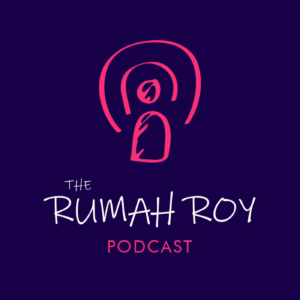

Pendulum Show
“Current affairs with a strong dose of millennial nonsense.”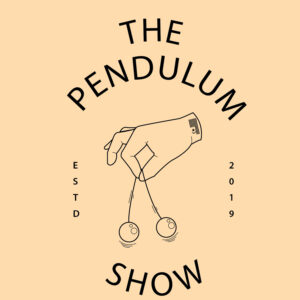

Bicara Minggu Ini
“A weekly podcast by Norman Goh, a freelance journalist discussing top issues in Malaysian politics, what’s trending and interviews with people you should know in politics, activists and experts.”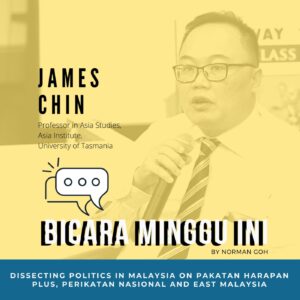

Q&A Learning & Self-Development
Kopi Konversations
“The Kopi & Konversations podcast is designed for young people to explore, learn and grow from the best people all around Malaysia and South East Asia.”
AntiFool
“My name is Norman Chella, and I’m on a mission to create the antidote to foolishness, so we can understand the world and ourselves better. My role is simple: I play the fool, I ask the questions, you get the answers. We’ll have conversations crafted for the curious, the vulnerable, the human. I interview authors, scientists, entrepreneurs, creators, movers all across the board.”
Sambal Pod
“A crazy idea by a bunch of Malaysian students who just wanna have real talk of any issue. It’s gonna get spicy people where any youth are welcome to share your story. Cause these stories matter, more than you think!!”
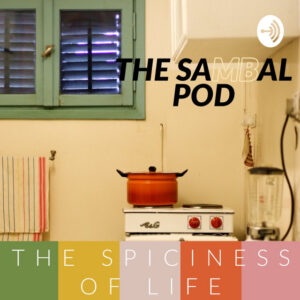
Podcast about Podcasts
Pod Lovers Asia
“Podlovers Asia is made to cover the Asian podcasting scene! The episodes range in format, from narrative to interview, and from informative to entertaining!”
Podcast Sessions: Malaysia
Games & Pop Culture
Geeks in Malaysia
“Amelia Chen, Khairil M Bahar & Nick Dorian talk geek from the depths of The Hub in Malaysia. Everything from comics to movies to games to TV shows to whatever else they deem geeky, here’s where these three release their inner geek.”

Epic Arcade
“A gaming podcast where we bring you the weekly updates from around the gaming universe. Hosted by Kelvin and Jeff, based in Kuala Lumpur, Malaysia.”

Technology
Tech this Way
“Technology is driving a lot of changes around the world including here in Malaysia. But who’s doing what ?.. where ?.. how ? This program talks to various tech leaders, shapers, observers or just the plain curious to answer these questions.”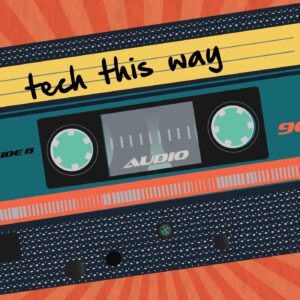

Go digital with Jason Low
“Every Wednesday stay tuned for new shows as I interview entrepreneurs, business owners, startup founders and soft solution providers alike on what it takes to grow your business to the next level with digital transformation!”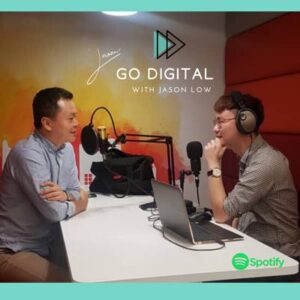

Slice of Life
Train of Thought
“Hop onto the Train Of Thought to train your thoughts for a better life. Train Of Thought podcast brings the combined day-to-day experiences of ordinary people to the table to look back, reflect deeply, and move forward in life.”
Bal’s Unscripted
“Bal’s Unscripted Podcast is a podcast hosted by Malaysian Biomedical Science Student, Rmiry aka (Iqbal). This Podcast is all about having unfiltered deep conversation on life, science, art and culture whilst sharing life experience featuring amazing guests who comes from different life backgrounds.”
Geng Gadis
“Making sense of the happenings from around the world to inside her body… journalist, social advocate and Sagittarian, Izza Izelan, delves into the growing pains of traversing the different moons of girlhood to womanhood in this modern time.”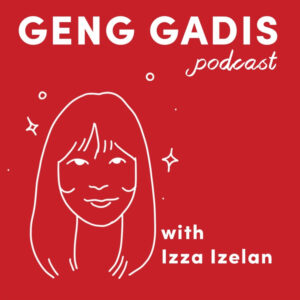

Comedy
Macha Men
“Malaysian comedians Kavin Jay and Keren Bala Devan share their unique perspectives on complete and utter nonsense.”
Books
TNTB
“Welcome to 2 Book Nerds Talking where we discuss books we love or those hot on the read list. We get to share reading insights, bookish topics, pick the minds of occasional bookworm guests and other general book nerdery. If you love books as much as we do, this is the podcast for you!”
